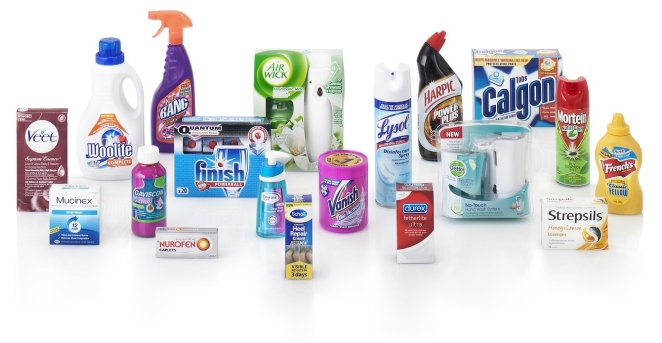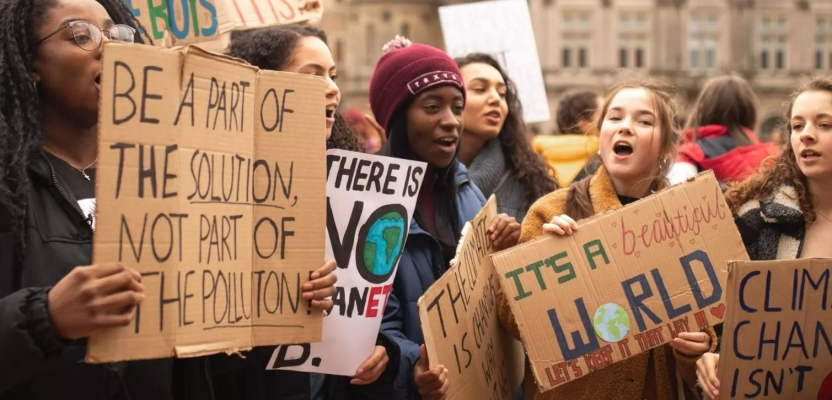Sophie Morice is a creative with a passion for sustainability and a brand associate at Reckitt – owner of household names such as Air Wick, Vanish and Finish
Of Generation Z – a generation that shows the most concern for the planet’s wellbeing – she was part of the sustainability association at university and has been campaigning and part of the youth climate movement for years.
With such a background and conviction, a move to the FMCG sector might not be the obvious one. However, today, Sophie explains how she ended up in her current role – and how she reconciles her convictions with the challenges of a more corporate and ‘big company’ environment.
As she says, “You either sit back and try and stop the massive machine by sitting on the outside, or you go on the inside and understand how something works in order to influence change.”

I describe myself as a climate activist. A term the dictionary defines as ‘a person who campaigns to bring about political or social change’; a person who is present and aware of the requirements for change.
I also work at a global FMCG (fast moving consumer goods) company within the Brand Experience & Design team – a business known globally for its mass production of products and services. These personal and professional mindsets don’t often meet, but at least for me, they provide an important opportunity to impact real change.
When I first joined Reckitt just over two years ago, I viewed my activism as separate to my role. I was part of the sustainability association at university and have been campaigning and part of the youth climate movement for years. If you’d asked me the direction these skills would have taken my career, I would not have predicted a move into FMCG.
Originally studying illustration, my shift into becoming a corporate brand owner wasn’t the obvious choice, but it was a career I was lucky enough to fall into.
Influence from the inside out

I’ve learnt a great deal from my short time within Reckitt and the opportunity I have because of it. When faced with the uncertain reality of our future, you can either step back from the systems that tie us and demand change from the outside or push further inside the industrial machine.
Both are important. But to be inside and understand not only how, but why the machine works the way it does is crucial to influencing large scale change. It is likely that I will be working for the next 40 years of my life. So I asked myself, what do I want to help build in those 40 years? What has the potential to make the biggest impact?
FMCG as a business is structured around short-term growth, replying on manufacturing and supply chains, making it notoriously slow to implement change. But working as part of the brand experience team at the heart of the business, has made me realise there is a heart of hope within Reckitt. A space where my personal passion for sustainability is amplified, shared across the team, and used to harness change throughout various parts of the organisation.
Brand experience and design in the FMCG industry is rooted in providing people with not only solutions to their problems but long-term connections with our brands. But design is also about challenging the status quo; if a solution can offer a great user experience and also be a sustainable innovation, why would you not push for both?
The latest news of Finish’s recent move to paper-based packaging whilst appearing to an unsuspecting shopper to be the same packaging and design, is one of the many steps Reckitt is taking to tackle the impending climate crisis. Its overall ambition is to contribute to creating a fairer society and healthier planet.
A forum for change

Everywhere the conversation is changing. This is no longer a discussion, but a requirement. Sustainability and environmental preservation must be interwoven into everything we create from now on. Within our work we need the tools to educate people and empower others to include sustainability goals at every level of the business.
Designers are inherently hopeful and imaginative. The creative industry is built on growing thoughts into ideas, into concepts, into reality, and then into experiences. Therefore, we are uniquely positioned to instil this process of creative expression and innovation in other people.
Within Reckitt, we are working to build a forum for change. We are connecting branches of the business along with our agency partners, to create a space for sustainability, innovation and envisioning the future.
Such a forum is needed to challenge ourselves and others; if you don’t give yourself the time to conceive change, it’s never going to happen. So, ‘turning the tanker’ of a big corporation requires the space to imagine the new destination – call it ‘imagination activism’.
As a team, we’ve also equipped ourselves with specific tools for change. Developing our knowledge of environmentalism and sustainability, all in the name of sharing this via the channels within our organisation. The ambition is for this toolkit and our team to help lay the foundations of change within FMCG. We want to ensure that the project concept stages allow room to challenge sustainability, and service-led business models are explored for new innovations.
This may take years, a timespan some activist could struggle to see the urgency in; it is a frustration I understand. But putting the building blocks in place for long-term change will impact our industries and societies for decades to come.
Acting at scale

Despite the apparent lack of immediate effect, within my role I enjoy the discussion, where my day-to-day experiences have the ability to effect real change. But in this change comes challenge; for me and many of my peers the biggest challenge is steering transformation at scale. When you have many minds working together on a project, all experts in a specific part of it, at different corners of the globe, you need to have strong connections.
That is where a solution to this challenge lies. My activism is centred on connections and understanding different perspectives. It’s about creating a space of collective inclusion and working as a team to solve the Rubik’s cube of FMCG, at scale.
This industry has changed beyond recognition over the past few decades, and it is near impossible to imagine its evolution over the next. We don’t yet have all the answers for solving the climate crisis. But like many Gen-Z activists entering the workforce, my commitment is to pursue a hopeful future, and I am proud to be right at the heart of trying.




